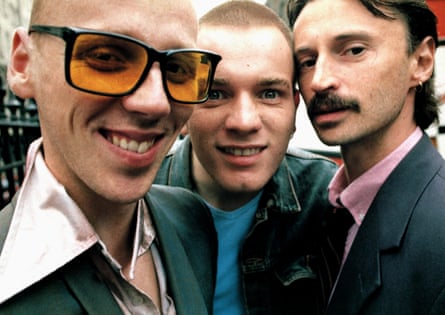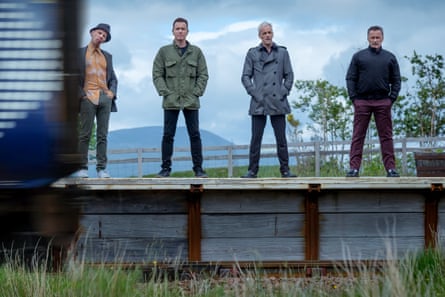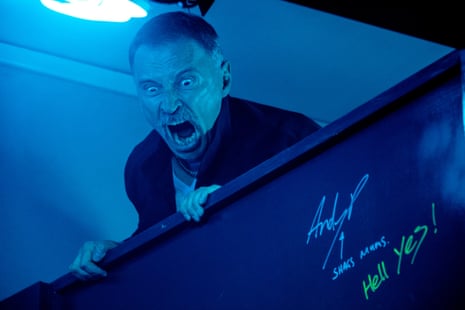In May 2016, a group of actors arrived in Edinburgh to begin shooting T2, the long-anticipated sequel to the fabled Trainspotting. Picking up the threads of his own film, director Danny Boyle had already been in the city some time. The novelist Irvine Welsh, writer of the original book, occasionally dropped by. And then came the stars – Ewan McGregor, Jonny Lee Miller, Ewen Bremner and Robert Carlyle, back to play moustachioed psychopath Francis Begbie. Each was now well into middle age. Their mood was united. “Oh, the fear was palpable,” Carlyle says. He still sounds nervous now. “You just don’t want to fuck it up.”
Carlyle says he fancied a sequel as soon as the original came out in 1996. It made perfect sense. The film had been a hit of giant scale, a cultural Godzilla whose filthy, rowdy portrait of life, death, sex and heroin in 80s Leith became a phenomenon. The cast had been made famous. All of them were up for another go around. It was Boyle who said no. “Danny kept telling us, ‘You’re not old enough.’ And it wasn’t until we actually started this that I understood. Because you can have grey dye in your hair, but if you don’t have real life experience, it’s not going to be there in your eyes.”
And so, in the end, the reprise took until now, loosely using Welsh’s own 2002 follow-up Porno as its source. It suits the air of homecomings that Carlyle is calling from Glasgow, where he’s spending New Year with his family (the conversation is briefly interrupted by his mother-in-law trying to use the upstairs phone). These days his time is mostly spent in Vancouver. Like all good British actors you haven’t seen in a while, he has a steady job on a US TV show, in this case Once Upon a Time, a modern riff on fairytale characters in which he turns up, still long haired and lean featured, as Rumplestiltskin. But his signature role remains Begbie. You suspect it always will.
As the years passed, there was another obstacle to any reunion: the rancour between Boyle and McGregor, after the director cast the actor aside in favour of Leonardo Di Caprio for The Beach, his 2000 adaption of Alex Garland’s Thai-set novel of blood and backpacking (Carlyle would play a supporting role). The pair were estranged for years; Boyle later publicly admitted a sense of guilt. Had Carlyle and the others kept in touch in the meantime? The answer comes with a sigh. “We didn’t. And it was a pity, because we’d all been very close. But we drifted apart. Me and Ewan in particular, we lost touch completely. The four of us went for a meal before filming and sat there in shock. We said, ‘How does this happen? How does this much time go by without setting eyes on each other?’ And there was a real sadness, and a desire not to let it happen again.”

Having had to return to Canada after shooting, Carlyle is yet to see the finished film. Still, he says he knows that amid the debauchery, the heart of the story is “the fate of these friendships we make when we’re basically children. So there’s life imitating art in there.”
There was always an irony to the career of Carlyle, gently spoken and a natural socialist, being so bound up with Begbie – an iron fist clutching a broken pint glass. But having grown up in Glasgow’s Maryhill, leaving school at 16 to work as a decorator, he knew that, in Scotland at least, the novel had connected with a cross-section of people “far, far wider than most novels do. So when we were making the first film, I thought, All right, it’s got a chance of doing something here. But then, when it came out – my God.”
The movie caused a splash internationally, but only after seducing the whole of Britain and its pallid, pimpled youth. “We pushed a button, didn’t we?” Carlyle says. Set in a non-specific 80s of smack misadventures and rave epiphanies, the film’s cackling energy and party soundtrack somehow became the perfect emblem of 1996, the long night of Tory government about to end at last, lairy optimism conquering all. If it seems like a lifetime ago, Carlyle knows how you feel.
“It’s a horrible word now, but in that Britpop moment, the film was right in the centre of everything. We all felt that when it came out. Politically, you felt it too. Change was coming.”
The mood of the nation that will greet the sequel is different. For years, Carlyle was a vocal political animal. Now, you need to raise the subject to get him started. “Down the years I’ve talked less about politics because it feels like this endless list of disappointments, but I was stunned about Brexit. And gutted. We need some leadership, and we haven’t had it for years. I look around and I can’t see one political figure I would trust to provide an alternative. Where is the Labour party?”
Brexit was made all the weirder for him by seeing it unfold from the west coast of Canada; 20 years will take most of us to places we hadn’t expected to end up in. For Carlyle – whose career has encompassed male stripping in The Full Monty and Russian-accented Bond villainy in The World Is Not Enough – nine months of every year since 2011 has been spent on the set of Once Upon a Time. On a show of such longevity, he says the directors are essentially there “to keep the ship steady”. He sounds more polite than enthused. (In 2015, he directed his own first film, The Legend of Barney Thomson, and wants to make more). And Vancouver, while diligently praised, isn’t Glasgow. “It’s a lovely city. But culturally it is different, and I miss the craic. I’m at the stage where even though Britain is in a mess politically, I think it’s time to pack up and come home.”

Photograph: Tristar Productions Inc
For Begbie, the years have been bumpy – much of his time between the two stories was spent in prison. Carlyle sounds exuberant describing the physical changes he made for the film, hair shorn back to a silvery number six crop, a dental implant removed from his lower teeth. “Then the tooth next to it comes loose, so I think ‘Fuck it, take that out too.’ Suddenly I see him come to life!”
And yet the backstory presented a dilemma for an actor who has always prized the authentic – in 1993 he slept rough while preparing to play a homeless man in the drama Safe – but who also knew the tone of Trainspotting was oddly fragile.
“I spoke to people who had served a lot of time, but in the end I didn’t use their experience. Real jail is a serious thing. Trainspotting was never about that kind of reality. It has its own. It’s Trainspotting World, isn’t it? And pushing that world to the limit is the secret of the franchise.” The line fleetingly goes quiet. “Trainspotting, the franchise,” he repeats. “Sounds funny, eh?”
- T2: Trainspotting is released in the UK on 27 January
